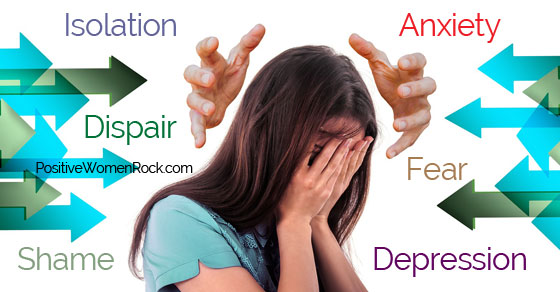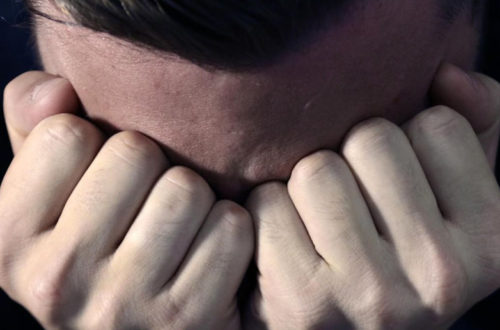The Twitter hashtag, #sicknotweak recently caught my attention because it reminded me how people with anxiety and depression are often marginalized as fragile, lacking resilience, or apathetic toward others. This misconception is stark contrast to how people with profound physical illness are often lauded for their “brave fight.” To assume the anxious or depressed roll over and play dead at the first sign of symptoms does nothing but reinforce stereotypes about mental illness that only serve to isolate when connection is most needed. For many, the pain of isolation leads to suicide, which despite the obvious extent to which a person has suffered is often regarded as the ultimate weakness.
I’ve been treated for Generalized Anxiety, Social Anxiety, and Panic Disorder. Consequently, these are the parts of me that have been most misunderstood by the people closest to me. Anxiety creates thought distortions to the extent they alter a person’s behaviors. In the case of most anxiety disorders those behaviors are related to avoidance. The problem is that while the behaviors are observable, the thoughts cannot be seen. Therefore, it is easy for loved ones to label me as uncaring when I miss gatherings, or cancel plans at the last-minute. They feel the impact of my absence, but they will never see the thoughts that motivated me to be avoidant. The few with whom I’ve risked describing my experience have suggested I “fight through”, “see the bright side”, or “control your thoughts.” After I struggle with shame for not being strong enough to control my own thoughts, I grumble, “thank you. I never thought of that”. I say that inside, of course, because anxious people don’t care for conflict. It makes us anxious.
Also confounding is that diagnostic imaging won’t detect the source of anxiety or depression, and because there is no medical explanation, skeptics assume a weak mind is the culprit, but anyone who believes anxiety and depression lack physical symptoms is mistaken. Depression can cause physical pain, and anxiety can cause nausea, tremors, or headaches. Ask someone who has suffered a panic attack if he experienced physical symptoms, and what he describes will sound like the dying process.
All people who suffer from anxiety or depressive disorders experience highs and lows. For me, lows mean avoidance, and counting missed opportunities in a fit of self-loathing. Highs mean not relying on alcohol to relax at social gatherings, or going on a cruise despite certainty I’d be lost in the Bermuda Triangle. Even completing a long drive on an open road without having a panic attack is a win for someone previously unable to complete the task. People who misunderstand mental illness don’t recognize these achievements because to a typically functioning person, they are mundane.
When it is suggested that anxious or depressed people should fight or persevere, an assumption is made that the fight hasn’t been happening all along, or it hasn’t been diligent. It creates blame culture equally as ludicrous as blaming someone for having Cancer. Such accusations cause internal judgement because anxious people weave others’ criticisms into their own mental narrative. Show me an anxious human being, and I will find the harsh inner critic fed when its host is admonished for not trying.
When people use phrases like, “just fight through” they are confusing anxiety with nervousness, and depression with sadness, even though there are stark differences. Nervousness and sadness are rational responses to real life stimuli while anxiety and depression are irrational, and stem from distorted thinking typically caused by genetics, family behavior, or trauma. An actor with stage fright has reason to be nervous, but for the anxious and depressed, the world is the stage, and everyone is throwing fruits and vegetables.
The assumption that anxiety and depression are not authentic illnesses forces people into closets, and facilitates reticence to manage symptoms with medication. People who regulate blood sugar with insulin are perceived as doing whatever is necessary to stay healthy. Conversely, a person who needs Xanax to cope with panic attack is taking the easy way out, or relying on a crutch. Similar stigma still exists regarding psychotherapy because therapy is supposed to be for “crazy” people. These misconceptions create reluctance to open up for fear of judgement. Instead, chat groups are utilized that while offering some compensatory support, lack the impact of direct contact.
People who suffer with anxiety and depression are not seeking pity. In fact, pity actually exacerbates symptoms and reinforces the stigma of weakness. Support and understanding will empower people to share pain, and seek help. Don’t assume a friend with agoraphobia is being a hermit, or that someone who misses a party doesn’t care. That person not only cares, but is devastated by what he assumes you might believe about him, and already believes it about himself.
Connection creates an alliance through which loved ones join the fight instead of assuming the fight is not there. Be it of body, or mind, sickness is sickness, and requires compassion as part of the healing process. No one knows when a first panic attack will strike, a dreadful thought will keep a person housebound, or acute stressors will result in suicidality. Should that moment come, we all need to know our loved ones will offer support without accusation, and response without judgement.





